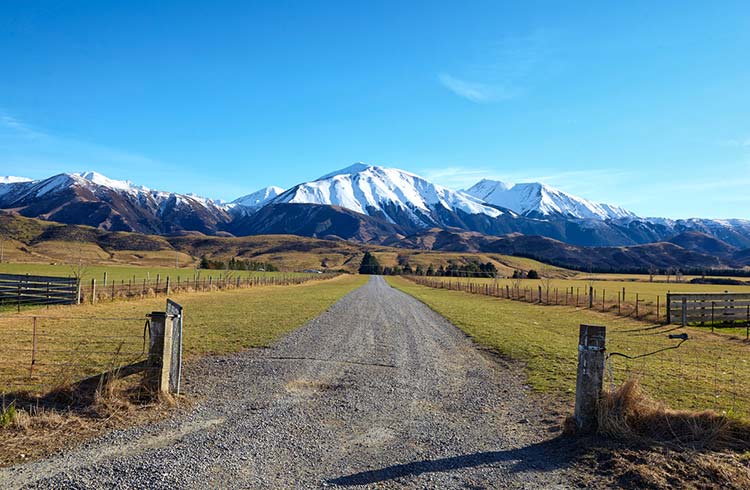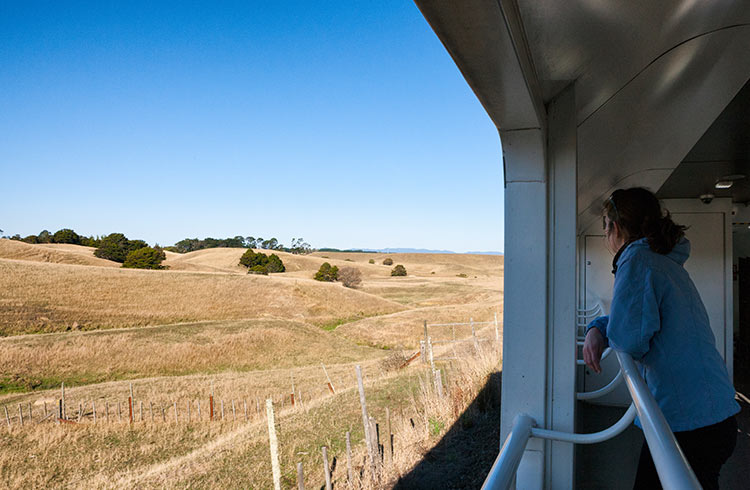A First-Timers Guide to WWOOFing in New Zealand
If seeing the world from behind a bar doesn’t tickle your fancy, but you really want to work abroad to immerse yourself into a new place and don’t mind getting your hands dirty, it might be time to think about WWOOFing.
Shares
 Photo © iStock/simonbradfield
Photo © iStock/simonbradfield
WWOOF (Worldwide Opportunities on Organic Farms or Willing Workers on Organic Farms) is an international network that connects volunteers and travelers to positions on organic farms, in an effort to promote and perpetuate sustainable living.
A popular destination for WWOOFing is New Zealand, which is no surprise considering the sheer number of organic farms.
But, what does WWOOFing really entail? Every opportunity is different, but you must start by signing up via the NZ WWOOFing website and creating a personal profile on the membership site. This is where you’ll find prospective hosts, and how hosts may even find you! Write a little bit about yourself, and what you’d like to get out of your volunteer experience in New Zealand. There is currently a NZ $25 membership fee (as of August 2023).
- How to find a WWOOF host
- Your responsibilities as a WWOOFer
- Valid working visa
- Types of WWOOFing experiences
How to find a WWOOF host
You can search by the map and find prospective hosts in areas you want to travel in, or even search by the skills you’ve got to offer to suit what someone is looking for.
Don't worry if you have no hands-on experience to offer yet, there are many hosts who are keen to teach the basics and contribute to a great learning experience for you.
Thoroughly reading the profiles of prospective hosts will give you an idea of what responsibilities you’ll have while living with them. Not all experiences are working in a garden, landscaping or farming. Some hosts will be seeking someone to help with childcare and house duties, and others may be seeking your assistance in running their hostel.
Explore the profiles, and once you find someone interesting, send them a personal message.
Your responsibilities as a WWOOFer
As a WWOOFer, you’re primarily signing up to be a volunteer, with an exchange of work for accommodation and food. Because every situation is different, make sure you clarify with your host if the exchange will be suitable for the both of you.
Once you have confirmed a date with your prospective host, be aware that they are preparing for your visit and often will buy extra food your arrival, or even have to turn away others. Once you make a plan with a host, stick to it. And if you feel unfairly treated by a host, the WWOOFing website has resources to contact them with your concerns.
As a traveler in New Zealand, you may not have a car to get to rural areas where your host may be located. Make sure you organize transport with your host, or allow adequate time to travel to your destination if taking public transport.
Valid working Visa
Don't forget, you usually have to have a valid New Zealand Working Holiday Visa, as well as adequate travel and health insurance for the type of activity you will be doing while WWOOFing in New Zealand. Make sure you check with your hosts prior to arrival if they require anything particular.
Types of WWOOFing Experiences
Rather than list the possibilities, we decided to ask the experts. We’ve collected WWOOFing accounts from across our travel community to give you first-hand insight into the life of a WWOOFer, what kind of work is available, and what to expect.
Landscaping in New Zealand
"Our first job was to rake seven loads of bark dust around the gardens in Ohiwa Domain, where we’d just taken a walk that morning.
Working for Meg and Mike included jobs like clearing space for a garden, building a planter box, cutting steps into a steep hillside, pulling 6ft weeds from an even steeper hillside, and clearing trails that led to animal bait stations.
Our accommodations were the best part. Their home doubles as a bed and breakfast, so we got to stay in the B&B part with a beautiful view of Ohiwa Harbor."
– Erin and Pete
Working on a farm in New Zealand
“Here’s my typical day: Up at 8am. Eggs for breakfast. Make oatmeal for the two dogs – Badge and Skip. Bring food scraps and milk to the two piglets. Feed chickens. Grade eggs – which involves washing and setting eggs on a machine which weighs and sorts the eggs. I then pack them and record numbers in the log book. Make bread. Milk Lulu – the house cow. Work in the garden weeding, preparing compost, harvesting cucumbers and zucchini, planting beans, watering seedlings. Lunch. Read a book. Collect eggs from six hen houses. Feed pigs. Feed dogs. Feed cat. Dinner. Watch movie.
It’s been refreshing to be in a place that is almost entirely self-sufficient. If I want a salad, I just walk to the veg garden. If I need lemon juice for the hummus I’m making, I go to the orchard.
Toni, the mother of the house, is a firm believer in slow food. She has a pantry full of large jars with nearly every ingredient needed for a recipe. She also preserves a lot of her fruit.
At first I was overwhelmed by all of the cooking and time put into eating, but I appreciate it. If I want bread, I have to make it. Although, I must confess that I am pretty bad. The last two loaves have been either too dry or too doughy, but I am learning.
There’s little waste in this household since all of the food scraps either go to the pigs or to the compost, and everything else is bought in bulk. Plus, the bags these things come in are re-usable. I don't think they have a trash can because everything has its place.”
– Elawlor
Working on a commune in New Zealand
“I spent three days at the Riverside Community – which I believe is New Zealand's oldest intentional community (commune). It started in 1941 as a Christian pacifist community in opposition to the war. Nowadays it is non-sectarian, and has about 75 members.
The community supports itself with a dairy (not organic), cafe, orchard, and mechanic shop, and has two very large organic gardens to grow produce shared by all members.
All members must either work in the community or contribute their wages from an outside job. All earnings are divided up equally – but, I'm sure there are exceptions for elderly, disabled, children and the rest for the work requirement.
Everyone gets the same amount of money to live off of each month, regardless of their job. They also run a hostel that was full of WWOOFers and travelers working offsite in nearby orchards and vineyards.
I stayed in the hostel and helped out in the garden in exchange for room and some produce, joined in cooking for the community lunch on my last day, and then went merrily on my way to explore Abel Tasman National Park.”
– Krista
Building a house in New Zealand
“Building your own house is hard work. Being in another country helping to build someone else's house is also hard work.
We learned a ton from Ian and Louise, and asked a million questions, all answered with so much sage advice.
The main structure of their straw bale house was built, and we were there helping with the bits and pieces that needed to be done before rendering the outside.
People will say 'this is the life' or 'I’m living the dream', but what it really is, is just stripping your life down to only what you need.
First, finding out what qualifies as 'only what you need' – and I learnt that it can be different for everyone – but, I think it's about stripping away rather than adding to what you have. The simpler life became on the trip, the more enjoyable it got.”
– The Nomads
Working on a “lifestyle” property in New Zealand
“Two Londoners (Dom and Frankie) spent time in New Zealand as WWOOFers, and were so taken by the beauty and quality of life here that they went home to London, earned some money, saved their money, then permanently relocated to the South Island in Wanaka.
They now have an awesome piece of "lifestyle" property in Wanaka, which means they have enough land to live off, but not quite enough for a full-scale farm. They live a very laid-back life, working "real" jobs two days a week and dedicating the rest of their time to working their land: planting trees, growing vegetables, raising chickens, etc.
We were assigned to jobs immediately. It began simple enough with potting tussocks, but over the days we also mulched, weeded, chopped wood, and staked trees.
After our five-day stay, just when we thought we were packing up to go, Dom and Frankie asked if we'd house-sit while they left town for a few days. They left us a list of chores and let us eat their food in exchange for four hours work a day. We worked in the mornings and then spent our days exploring Wanaka. It was awesome.”
– Erin and Pete
Learning about sustainability
"I stayed with Tim in Karamea, where he has two properties surrounded by food forest. Tim aims to teach his WWOOFers about a self-sustaining lifestyle, and creating edible forests and gardens around us so that we can be self-sufficient no matter the circumstance or the time of year.
Tim was very much self-taught in his journey of sustainability based on his own curiosities, but has become extremely knowledgeable and well versed in everything from gardening, to composting, to soil pH and to food preservations.
It was an incredible opportunity to live on a self-sustaining property in a rugged and remote area in New Zealand. This was an incredible opportunity to be hands-on with gardening and maintaining the grounds, but also was an chance to synthesize and take knowledge back to the city to incorporate into our lifestyles there.
Not to mention, he had insider knowledge on the best hiking tracks nearby, and escorted us on some incredible day-hike journeys on the West Coast!"
– Ashleigh Anne Gureckas
Have you got a story to tell? Tell us about your WWOOFing experience!
Related articles
Simple and flexible travel insurance
You can buy at home or while traveling, and claim online from anywhere in the world. With 150+ adventure activities covered and 24/7 emergency assistance.
Get a quote

No Comments